- Home
- Patrick Ness
Burn Page 6
Burn Read online
Page 6
“Sarah—” Jason said, following her out, stopping when he saw Kelby.
“Everyone knows your kind are whores,” Kelby said, with a calm delight that was more unnerving than his stupid rage could ever have been. He glanced over to Jason. “But doing it with the Yellow Peril? That’s gotta be the lowest of the low.”
“And you’d know, would you?” Jason said.
This time, Sarah didn’t even try to warn him. Nothing was going to happen now that could possibly be made worse.
“Slut,” Kelby said again, still with the smile. “Your daddy is gonna love this.”
“Stop talking to her like that,” Jason said.
“And who’s going to make me?” Kelby stepped forward, tossing the police baton up in the air with a spin, catching it like he was playing a game.
“We weren’t doing anything wrong,” Sarah said, her voice shaky.
“Then why were you hiding it?” Kelby sneered.
“Why do you do this?” she whispered as he approached, backing her up. “Why are you like this?”
“I don’t have to have a reason,” he said, “not for a filthy whore like you.”
“Don’t call her that,” Jason said, stepping between them. Kelby’s baton lashed out so fast Jason didn’t even have a chance to duck. It hit him on the throat, and he fell to his knees, coughing as if to choke.
“Stop it!” Sarah yelled.
Kelby turned back to her. “Or you’ll what?” He advanced on her again, until she felt the dumpster at her back. He came uncomfortably close. “Hey,” he said, whispering now, “maybe we can come to some understanding. Maybe you could give me a little of what you give him.”
He moved even closer. She could smell his rank body odor, see the way his hungry, weasly eyes darted in the streetlight. He moved the baton down to the hem of her skirt and started to raise it.
“No,” she said.
He didn’t listen.
“No.” But he kept pushing up the fabric. In her terror, she said something, too quiet for him to hear.
“What did you say?” he whispered.
“I said, everyone hates you.”
He stopped. She was trembling now, her voice, too, but somehow her eyes were steady when they met his. “Everyone in this town hates you. Don’t you see their eyes roll when they say your name? How stupid they think you are? Even the most hateful people here think you’re an idiot.”
The word was too much. The sentence was too much. The entire paragraph was too much. Sarah knew it, could see it on Kelby’s face. She had stepped off a cliff and had only to wonder how far it was until she broke all her bones on the ground below.
“Sarah,” Jason coughed, getting to his feet, but too late.
Deputy Kelby stepped back, unbuckled his gun, and took it out. “You’re under arrest, girl.”
“For what?” Sarah said, but she knew. No one who looked like her could ever talk like that to someone who looked like him.
“Assaulting a police officer,” Kelby said.
“She didn’t assault you,” Jason rasped.
“Really?” Kelby said. “Then how come I had to fight back?”
Without warning, he swung the gun, hitting her jaw, knocking her to the dirt of the alley. The shock was more overwhelming than the pain, which was distant and not immediate. It was as if her head had fallen off somehow, her blood jumping right out of her skin, her whole body reacting against this this this—
Above her, she could hear grunts and thuds, flesh against flesh, fist against bone. Jason had gone for Deputy Kelby. She’d been wrong. There were lots of ways this situation could get worse. She had no idea who was getting the best or worst of the fight, but there was no outcome that would be good for Jason or for her.
She tried rolling over, a hand to her jaw, wondering if it was broken, still trying to speak. “Jason—”
They still grappled.
“Jason, just let him go—”
The gun went off.
She froze. Jason and Deputy Kelby seemed to hold each other in a kind of shock.
“Jason?” she said. “Jason!”
Jason lurched back a step from Kelby. Even in the dim light, she could see the shine of blood across the white shirt Jason wore for the diner. White no longer.
“No,” she said, still struggling to rise, still struggling to talk, a loosened tooth falling to her tongue so she had to spit it out. “Jason—”
Deputy Kelby fell to one knee. He dropped the gun, as the hand that was holding it didn’t seem to work any longer. Jason took another step back, eyes wide, as Sarah saw the small wet circle on the front of Kelby’s uniform. It seemed so minor a wound, so modest against his stomach.
“Oh, no,” she heard Jason whisper.
Kelby looked up at him, his face stunned. He opened his mouth to speak but spat out only blood. He turned slightly, and Sarah saw the exit wound. A crater had opened on his upper back.
She expected him to fall forward, every bit of logic said he would, but incredibly, he started to stand again. He was struggling to his feet. Jason looked as terrified as Sarah felt. They watched as Kelby, still trying to speak, hoisted himself upright, spat out more blood, but still didn’t fall.
He reached out for Jason and died.
She could actually see it. Deputy Kelby’s eyes were still open, but something vanished. His soul? Did he have one? It didn’t matter. He died.
Before his body fell to the ground, Kazimir was there, stepping out of the air at the end of the alley, snaking his head down the passage between Al’s diner and the tall fence behind. He grabbed the falling body of Deputy Emmett Kelby in his mouth, bit him in half, then swallowed both parts in two great gulps. He took another bite out of the dirt where Kelby had bled, scooping it up like a shovel and spitting it into the field behind the diner.
In less than thirty seconds, no trace of Kelby remained, aside from the gun on the ground and the blood on Jason’s white shirt.
“You are more reckless than I expected, Sarah Dewhurst,” Kazimir said, looking at her with his one eye.
There again was the smile.
Six
MALCOLM WAS FALLING behind. Clouds had settled in as he walked south and were threatening snow. They were to be expected, of course, this was Canadian winter, but he had daily goals to meet, set for him before he departed. He had missed the very first one because of the two men and the wound to his ear. He’d missed the second even though he’d been rushing to catch up. And if snow started he was going to miss the third.
Delay had been built into the schedule, one couldn’t foresee everything, but there was a deadline he had to make. A particular place on a particular day at a particular time.
Or everything was lost.
“But that will not happen,” he said to himself, as happily as he could. “My path is blessed. My path is guarded.”
Your path will be guarded, the Mitera Thea had told him, before she’d left the last time to prepare other Cells for the success he would bring, reminding him—as if he needed it—that he was expected to bring success. Because your duty is sacred. You go to defend everything we believe in. You go to stop a war.
But I will have to kill to stop it, you say, Malcolm had replied, as he had many times over many years.
Your worry is why you were chosen, my son. An eager assassin has no moral purpose. But you know what you do. You know why you do it. The young are always the truest Believers, which also is your best disguise and why you, among all, were chosen. No one will know who you are. No one will see you coming. Not until your fist strikes knowing exactly why it does so: to save the Exalted we worship. Besides, what is a human life compared to a dragon’s? We are insignificant. We are as rats. They ignore us because we have failed them, but you, my son, you and I shall capture their attention again through this great, great act.
And we will stop a war?
No, my son, you will stop a war.
“My path is guarded,” he said again now, watchi
ng the clouds. “My path is blessed.”
If it did snow, he had instructions on the options he might take. Hotels were out because they required a record of his presence—no matter what name he might give, they’d still have something to attach to the memory of his face—but no one required him to freeze to death.
Make a solitary camp, if he could, with a fire. That was first choice. He had a small tent in his bag, and even if there had been those who’d questioned his skills and suitability for this journey, there was never any question about whether a Believer could make a fire. It was like asking ice to make water. But where? Civilization had started to creep in, and there were any number of houses who would see a stray column of smoke and worry about an odd stray fire, even in a wintry forest.
It had to be a campground. Fires were normal; even if others used them, Malcolm could blend in. He knew the locations of several along his route, both official and itinerant. One wasn’t too far, and the first snowflakes of what promised to be many more eased his decision.
He turned off the road, waiting for a tractor to pass so he could climb a fence and cross a long-harvested field without being seen. On the other side, he ducked through some trees, crossed a creek, and found himself behind a sign indicating the campground, right where he expected.
He carried no map except the memorized one in his head. It was reassuring to know it matched reality. He looked into the clearing that made up a poor but clean camping area. There was already a fire going, in what seemed to be a concrete communal hearth. Malcolm could see only one tent, planted close to the fire, with a young man in front of it, warming himself on the flames.
One man. Malcolm could handle one man if he had to, and who said he would have to? The long and short of it was that it had been two days since he’d left the pharmacy, two days since he’d spoken to anyone except in prayer, and Malcolm . . . well, he was ashamed to admit it as that, too, was one of the questions about his suitability for this, but out here, with no one to judge him, he could admit it to himself. He was lonely.
The campfire seemed safe enough.
So Malcolm stepped out of the trees and met Nelson, and the fate of billions was changed.
“One more day,” Agent Dernovich begged into the phone, and it was begging.
“You’ve found nothing, Agent Dernovich,” said Cutler, crackling across a long-distance line from Washington, D.C.
“We found evidence of murderous dragon activity—”
“You’ve found nothing since.” Cutler’s voice was a granite cliff. Waves could crash on it for thousands of years before he’d change his mind. “Which is rather more to the point.”
“Our guy must be nearing the border—”
“You know you should be looking for a woman. Believer cults are heavily matriarchal.”
Dernovich glanced over to Agent Woolf, who was writing god only knew what in painfully tiny lettering in her notebook. She was hard to think of as a matriarch.
“I have a hunch it’s a he,” Dernovich said now.
“A hunch is worth exactly jack in this office. We have a very dangerous set of murders-by-dragon to solve before it becomes an international incident, Agent. Unless you’ve got facts . . .”
Agent Dernovich didn’t have facts, but he did think he had more than a hunch. The trail—if it had ever been one—had vanished. Drops of blood in a forest turned out to be a better metaphor for something hopelessly lost than needles and haystacks—
But that boy. That Believer coming out of the pharmacy who had vanished into the riverbank. Dernovich had followed up on him, after it had gnawed on his brain all night in that horrible hotel room where he could hear Woolf snoring through the walls. The boy wasn’t a student at either of the local schools. The pharmacist had never seen him before either, but she did say he gave his name as Malcolm.
She also said it looked like he might have been shot.
“We’re still looking for that boy,” Dernovich said to Cutler.
“That boy you watched walk away and did nothing about? That teenage boy we’ve had an APB on for the last thirty-six hours who’d stick out like a sore thumb in what the Canadians think of as a populated area.”
“He would have been trained to be inconspicuous—”
“They would not send a boy for this job!” Cutler shouted. “It was the women who did all the dirty work in the past. You and I both know they would send someone who looked like Woolf. Or either of my ex-wives.”
Dernovich glanced again at Woolf, now taking a sip from her root beer in the booth of what felt like the thousandth diner they’d eaten at this week. What Cutler said made a lot of sense. In fact, it made so much obvious sense that Dernovich was increasingly certain that Cutler was one hundred percent wrong.
“One more day,” he said, as calmly as possible. “I’ll get you proof.”
“One more day,” Cutler relented, “but you won’t.”
He hung up. Dernovich idly put his finger in the coin return to see if any money had come back, then headed to the booth. Woolf didn’t greet him or ask how it went with Cutler; she just said, “I’ve been thinking we should check a certain kind of campground.”
“They’ve all been searched,” he said, sitting down, gesturing to the waitress for more coffee. “He’s not there. No one’s seen him.”
She looked at him askance. “He’s a moving target, Agent Dernovich. We aren’t watching all the campgrounds simultaneously. We haven’t even been honest about why the RCMP should be looking for him.”
This was true. He and Woolf were still there not-quite-officially. Their home office had had to come up with a cover story about a suspected Communist sympathizer, which Dernovich was pretty sure no Canadian would ever believe. Woolf had gotten nowhere with calls to local Believer Cells, but then she was a known apostate, so that wasn’t surprising. Not one of them even acknowledged knowing about the existence of a boy.
“Which is odd,” she said now. “If they were going to try and throw us off, they’d have pretended to know him. Create too many trails rather than denying there’s one at all. That’s how Believers work.”
“But that’s not what they did.”
“How they refused my inquiries suggests they thought I was a time-waster, that they actually didn’t know about the boy.”
“And so?”
She took a thoughtful breath. “Do you have children, Agent Dernovich?”
He coughed in his coffee. “We’ve been working together all this time, and you don’t know the answer to that question?”
“You didn’t know I was a former Believer.”
Touché, he thought. “All right. No, I don’t. I never met the right woman. I’m from a small town east of the mountains in Washington state. No one there wanted to do all the traveling I do, and no one in the East Coast offices wanted to settle in a tiny mountain town. Plus, you know, the work.”
“The work is extensive,” she said, in what for her probably counted as warmth.
“It’s the biggest regret of my life not having children. I lost three brothers in the war. I wanted a family more than anything but . . . not to be.” He felt the familiar despair in his chest at these thoughts, which made him even more annoyed that he’d revealed them all to Woolf. “Why do you want to know?” he asked, with considerably less grace.
“Believers raise their children communally,” she said.
“I know.”
“This is often mistaken for neglect, but that isn’t the truth. They’re protected fiercely, as it’s believed dragons do their broods.”
“So?”
“So how and why is a young Believer on his own in the winter in western Canada with no local Cell knowing who he is? There aren’t that many of them. If I were to walk into a Cell here, chances are I’d probably know at least two people personally.”
“So where did this boy come from?”
“And where might he be going, seemingly without the assistance of any other Cell?”
He
looked down as she unfolded a road map. She’d circled five potential campgrounds, all of them within driving distance.
“What other leads do we have?” she said.
He knew she was right, of course.
Before he even asked Malcolm’s name, Nelson offered him food. It wasn’t much—some salted pork—but he held it out to Malcolm by way of greeting as Malcolm stepped into the circle of the campfire.
“Thank you,” Malcolm said. He took a bit of travel bread from his bag and added it to the mix. Nelson nodded gratefully. As he’d neared the campfire, Malcolm had guessed Nelson’s age at early twenties. Now that they sat eating, he saw that Nelson was younger, perhaps only a year or two older than Malcolm himself, if that.
“Nelson Arriaga,” Nelson said.
“Malcolm.”
“No last name?”
Malcolm mentally grabbed one at random from the list he’d memorized. “McCormack.”
“Scottish?”
Malcolm shrugged. “Just Canadian.”
Nelson laughed at that. “My grandparents came here from Guatemala. I can tell you for sure that no one will ever call us ‘just Canadian.’”
Malcolm smiled back, though to be honest, he didn’t quite understand.
They ate their small meal, and after, Nelson took out a rolled cigarette. He didn’t offer one to Malcolm, who wouldn’t have taken it anyway. To be honest, Malcolm didn’t quite know what to do now. The fire was warm, the food had been good, but the snow had picked up, little tablets of it drifting into their food as they ate. Malcolm needed to get back on the road, but it was just that little bit hard to get going right this minute.
“Where are you headed?” Nelson asked, and for a startled moment, Malcolm genuinely believed his mind had been read.
“South,” he said, vaguely.
“The border.” Not a question, merely the obvious assertion. “You crossing it?”
Malcolm went to one of the stories he’d been given. “I’m going to my aunt and uncle’s farm,” he said. “To work.”
Nelson raised an eyebrow. “In January?”
“Always work needing to be done on a farm.”

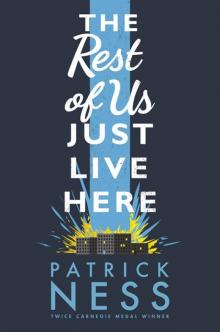 The Rest of Us Just Live Here
The Rest of Us Just Live Here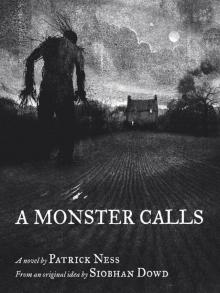 A Monster Calls
A Monster Calls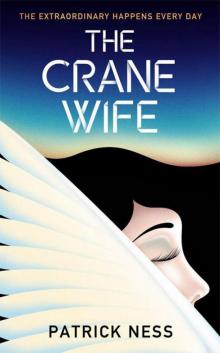 The Crane Wife
The Crane Wife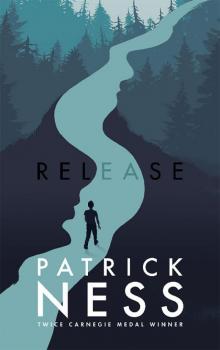 Release
Release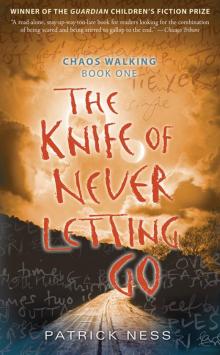 The Knife of Never Letting Go
The Knife of Never Letting Go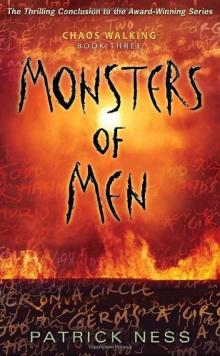 Monsters of Men
Monsters of Men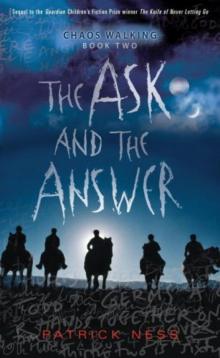 The Ask and the Answer
The Ask and the Answer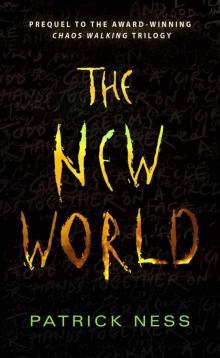 The New World
The New World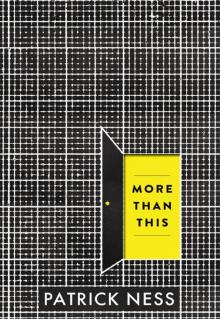 More Than This
More Than This Burn
Burn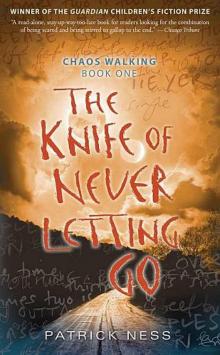 The Knife of Never Letting Go cw-1
The Knife of Never Letting Go cw-1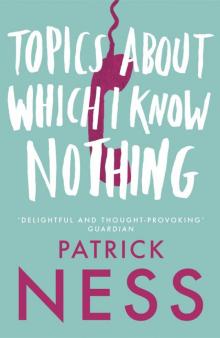 Topics About Which I Know Nothing
Topics About Which I Know Nothing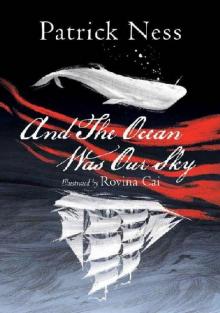 And The Ocean Was Our Sky
And The Ocean Was Our Sky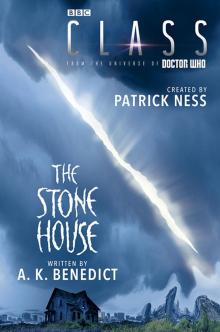 The Stone House
The Stone House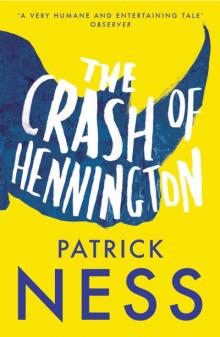 The Crash of Hennington
The Crash of Hennington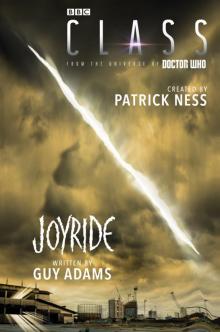 Joyride
Joyride What She Does Next Will Astound You
What She Does Next Will Astound You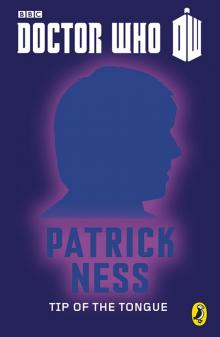 Tip Of The Tongue
Tip Of The Tongue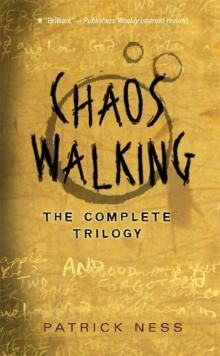 Chaos Walking
Chaos Walking